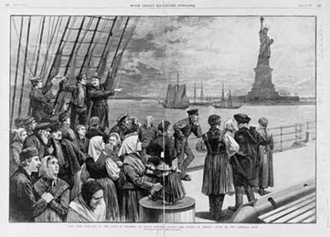What’s old is new
Enduring immigration perspectives: the “contradictory and impossible”? or a hopeless aspiration?
The word “immigration” comes from the Latin verb “immigrare” and is generally used to mean coming into a place for the purpose of permanent residence. Philosophically, we are all “immigrare’s” of some sort; and conceptually, “immigration” is not in itself controversial.
But it becomes a contentious topic when compounded with the complexities of human creations—for example, racial or religious prejudices. To best put it,
“We demand the contradictory and impossible. We desire [immigrants] to be excluded because of our own prejudices and admitted because of our need of the sort of productive energy which they posses, and because we realize that one, if not the chief, of all the glories of this country, is that the asylumship for the unfortunates of practically every race of people on earth.” (Cincinnati Enquirer, Japanese Immigration, June 26, 1920; emphasis added.)
The topic of immigration (distinguished from the concept) therefore becomes an easily self-serving one. On the one hand, we utilize it to create an “us” versus “them” phenomenon, so that we can easily articulate and justify our fear to our advantage. On the other hand, we utilize it as a contrite method of discussing labor economics at our convenience; we are capitalists, after all.
This playacting on the topic is nothing new. It is easily recognizable today on both sides of the political aisle. It is naive to think this phenomenon does not reached far back into our country’s history, or that it does not permeate to all walks of life. Perhaps naivety is simply my ideological denial, but I find what was old is now new again. The topic‘s self-serving seems evergreen for its worth in political or economic gains.
For example, an 1878 Cincinnati Enquirer editorial piece articulating the immigration problem in California:
“Appeals to Congress for protection are circulating all over the State, and are signed by all except those who profit in some way … the body of this Asiatic death which is weighing down the people of the [California] state and paralyzing every industry of the coast. … but when the field of labor is full here they will go east and south.” (Cincinnati Enquirer, California’s Curse, Feb 11, 1878).
Another 1880 editorialist’s title simply read:
“Garfield’s Death Warrant – His famous letter advocating an extended Chinese immigration, he declares himself adverse to the laboring man’s interest and is favor of the employer’s union, advising them to employ the cheapest labor available.” (Cincinnati Enquirer, October 23, 1880; it should be noted that James Garfield, a Ohio native, was elected the 20th President of the United States, serving from March 4, 1881 until his assassination later that year.)
And one from 1911 reads:
“Limiting the number of new comers permitted to land during a year from certain specific countries believed to send undesirable materials … they insist that there is a scarcity of labor in this country …. The objection made by some that as things are going the country will become Roman Catholic [are regarded] as cowardly and narrow in a land of religious tolerance and freedom …” (Cincinnati Enquirer Immigration Consideration, January 29, 1911).
Finally, the topic of immigration has also been tagged with the kind of self-serving opinion in the context of post-Civil War African American migrations. (E.g., Cincinnati Enquirer, The Rights of Labor – Negro Immigration, July 16, 1862; South Carolina Now and as She Was, February 17, 1871).
But is this topic strictly limited to being self-serving? Or is there some hope in being the naive:
“To the Members of the volunteer Associations & other Inhabitants of the Kingdom of Ireland who have lately arrived in the City of New York.
Gentlemen …
The bosom of America is open to receive not only the opulent & respectable Stranger, but the oppressed & persecuted of all Nations & Religions; whom we shall welcome to a participation of all our rights & privileges, if by decency & propriety of conduct they appear to merit the enjoyment.”
In 1783, George Washington welcomed new Irish immigrants in the City of New York and his remark suggests something important, does it not?
First, the “opulent and respectable Stranger” as well as the “oppressed & persecuted of all Nations & Religions” are equally entitled to participate in “all our rights & privileges” set forth in the Constitution. Second, this entitlement of participation is condition upon the participant’s “decency and propriety of conduct” that merit the enjoyment of such equal protection and opportunity.
Immigration to the United States has never been just about humanitarianism, politics, or economics. This country is not a place where the road is paved with gold and our democratic republic is not just about handing out its preciousness to all who walk upon its streets. Perhaps immigration is an aspiration of a national strategy—a call to participate in the constitutional experiment as we know it; and in such an experiment, it is important to remember that we are great together not by asking what we shall receive, but what we can do to contribute.
In the famous words of the good who died young:
So while this country’s immigration history may prove to be self-serving at times; its founding principles may be worth saving, at least for a naive immigrant such as myself.

The blog is in part of the Mission Continues blog series, written by Jin Kong and therefore all words and thoughts are his own and not a reflection of GCWAC.


